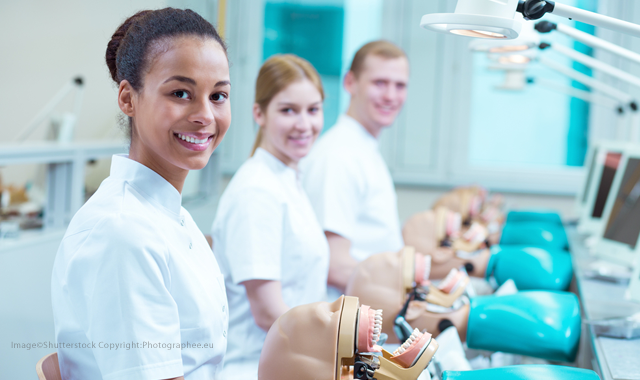Should you become a dental hygiene educator?
Would this career change be a good move for you?

There is something special about being a dental hygiene educator. Having the opportunity to shape the future of our profession is an honor and a tremendous responsibility.
People often wonder what is the best thing about being an educator. You may hear educators talk about the “lightbulb” moment, when a student finally understands a topic or skill-set they have been struggling with. For me, it is the opportunity to help someone make his or her dream become a reality. The ability to guide and coach an individual’s journey to being the best hygienist they can is a blessing. People often ask me, “what do I need to do to become a dental hygiene educator?” I thought I would share with you some strategies on becoming and educator and what skill sets you must possess to perform well in this arena.
Trending article: 5 tips for landing the perfect job
First let’s look at what skill set one must have to be in the educational environment. According to some students informally polled there are certain qualities and characteristics which make for an excellent dental hygiene educator. The person should be passionate about dental hygiene and teaching. When an instructor has a love for what they do it energizes the learner and keeps them engaged in the learning process. Other qualities include the ability to work with several different learning styles with the ability to clearly explain theories and skill sets needed for the profession. A person who can identify a student’s strengths and weaknesses providing balanced feedback of both. Students also stated working with instructors who empower the student and set realistic goals creates a positive learning environment.
There are also the physical abilities that should be considered. If you have decided to leave clinical hygiene because you can no longer handle the physical strain of chairside care transitioning into education may not be the reprieve you are looking for. While you aren’t scaling teeth for 8-10 hours a day you are still on your feet often hunched over students as they work with patients. It can be physically demanding and exhausting.
Trending article: 7 tips to make your dental hygienist resume stand out
The level of education you need to acquire depends on what courses you are teaching and what the dental hygiene programs policies are. Per the Commission on Dental Accreditation (CODA) full-time faculty must have a baccalaureate degree or higher and part-time faculty teaching didactic courses should also have the same level of education. All dental hygiene program faculty members must have current knowledge on the subject matter, a background in educational methodology, and if they are a dental hygienist, have graduated from a CODA accredited dental hygiene program1. It is best to check with the educational institution in which you would like to work to understand their minimal educational requirements. In regards to the focus of one’s degree there are a plethora of choices. A degree in dental hygiene, education, public health or some science based degree are fantastic options. Again, some institutions may have strict requirements on which degree is required, while others may only require you to have a bachelor degree
As stated earlier educational methodology is a requirement. Opportunities to engage in these courses are endless. The American Dental Hygienists’ Association and the American Dental Educators Association have numerous resources available. Being a member of professional associations is necessary, if you aren’t a member I highly encourage you to become one. ADHA supports all the efforts of dental hygienists and has several resources to help you take your career to any direction you want. ADEA connects you with all dental educators to be an effective resource for your students and colleagues.
Trending article: Are you bored to death in the dental practice?
To see if the educational environment is the path for you, volunteer your time in the clinical setting. Schools have tight budgets but often need extra help coaching students. There may be a special clinical exam in which hygienists from the community can come to assist in the process. Or, perhaps you have a topic of interest you would like to share as a guest speaker. Volunteering your time not only helps you decide if the educational setting is right for you, but it allows the other faculty to get to know you and keep you in mind if a paid position becomes available.
Another way to explore the field of education is to host a dental hygiene student at your place of employment. Let them shadow you. Educate them on your role within your work setting. Become a resource and mentor to the student. I believe you will find this to be a rewarding experience.
Being a dental hygiene educator is an amazing career. Whether you are clinical adjunct or a fulltime professor there is more to the job than just teaching. You are a coach, mentor and counselor. One of the best parts is getting to educate your future peer. I encourage you to reach out to the educational institutions in your area. Get to know the facility and the people who dedicate their time to guide the future of our profession.
1 CODA Accreditation Standards for Dental Hygiene Education Programs. Standard 3-7